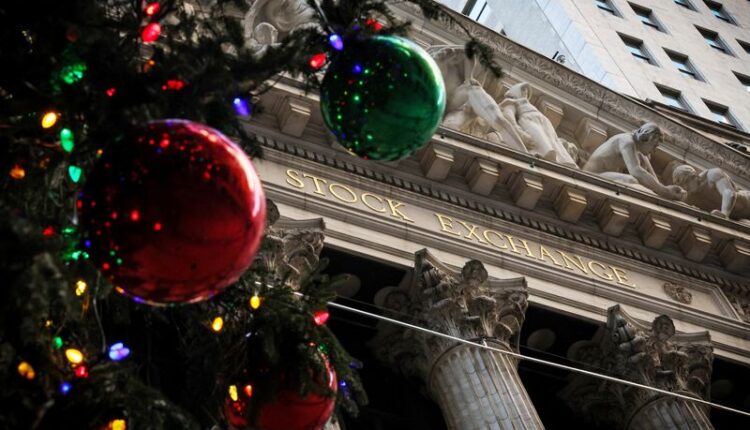Wall St rises after soft inflation data; Nike slides
By Johann M Cherian and Shristi Achar A
(Reuters) – Wall Street’s main indexes gained on Friday after a key inflation reading came in softer than expected, boosting recent investor optimism that the Federal Reserve could lower borrowing costs next year.
The personal consumption expenditures (PCE) price index, considered to be the Fed’s preferred inflation gauge, climbed 2.6% in November on an annual basis, compared with expectations of a 2.8% rise, per economists polled by Reuters.
The core inflation figure, which excludes volatile food and energy components, rose 3.2% on a yearly basis, compared with an estimated 3.3% rise.
“This helps confirm the idea of a rate cut as early as March,” said David Russell, global head of market strategy at TradeStation.
“This data shows us that the inflationary turn happened some time ago and as we move further into the future, the base effects will continue to kick in.”
Another report showed, orders for long-lasting U.S. manufactured goods surged in November, boosted by aircraft bookings, but business spending on equipment appeared lackluster amid higher borrowing costs.
Analysts also said light trading volumes ahead of the Christmas break could also impact moves during the day.
Traders see an 84.6% chance of at least a 25 basis point (bps) rate cut in March next year, and expect borrowing costs to be lower by 125 bps in September 2024, according to the CME FedWatch Tool.
The S&P 500 and the Nasdaq finished over 1% higher on Thursday after data signaled third-quarter U.S. economic growth was not as robust as originally stated, bringing the benchmark index within a whisker of its record closing high.
All three indexes are poised for their eighth-straight week in the green, with the S&P 500 set for its longest weekly winning streak since 2017, and the Nasdaq and the Dow since 2019.
The rally gained momentum last week after the central bank acknowledged that inflation was nearing the target rate, bringing interest rate cuts “into view”.
Meanwhile, Dow component Nike (NYSE:NKE) plunged 10.0% after the sports-wear maker trimmed its annual sales forecast blaming cautious consumer spending.
Shares of other sports-wear firms like Lululemon Athletica (NASDAQ:LULU), Foot locker and Dick’s Sporting Goods (NYSE:DKS) dipped between 3.0% and 1.3%.
At 9:46 a.m. ET, the Dow Jones Industrial Average was up 85.05 points, or 0.23%, at 37,489.40, the S&P 500 was up 22.29 points, or 0.47%, at 4,769.04, and the Nasdaq Composite was up 71.89 points, or 0.48%, at 15,035.75.
All 11 S&P 500’s sectors were in the green, led by a 1.2% advance in utilities.
Among other movers, Occidental Petroleum (NYSE:OXY) added 2.0% after Warren Buffett-led Berkshire Hathaway (NYSE:BRKa) raised its stake in the oil firm, bringing it closer to 28%.
Karuna Therapeutics (NASDAQ:KRTX) soared 47.5% after Bristol Myers (NYSE:BMY) Squib agreed to buy the schizophrenia drugmaker for $14 billion in cash.
Markets will remain closed on Dec. 25 on account of the Christmas holiday.
Advancing issues outnumbered decliners by a 5.29-to-1 ratio on the NYSE and a 3.04-to-1 ratio on the Nasdaq.
The S&P index recorded 29 new 52-week highs and no new low, while the Nasdaq recorded 94 new highs and 24 new lows.

